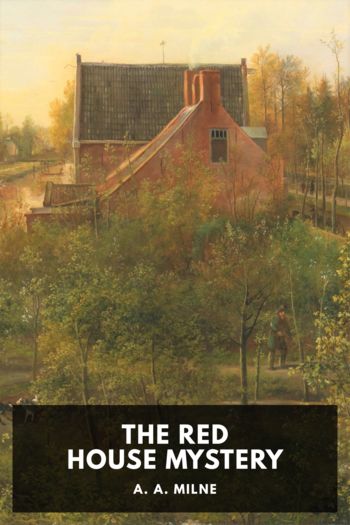Short Fiction Edgar Allan Poe (books for men to read .txt) 📖

- Author: Edgar Allan Poe
Book online «Short Fiction Edgar Allan Poe (books for men to read .txt) 📖». Author Edgar Allan Poe
There came a light tap at the library door—and, pale as the tenant of a tomb, a menial entered upon tiptoe. His looks were wild with terror, and he spoke to me in a voice tremulous, husky, and very low. What said he?—some broken sentences I heard. He told of a wild cry disturbing the silence of the night—of the gathering together of the household—of a search in the direction of the sound; and then his tones grew thrillingly distinct as he whispered me of a violated grave—of a disfigured body enshrouded, yet still breathing—still palpitating—still alive!
He pointed to garments;—they were muddy and clotted with gore. I spoke not, and he took me gently by the hand: it was indented with the impress of human nails. He directed my attention to some object against the wall. I looked at it for some minutes: it was a spade. With a shriek I bounded to the table, and grasped the box that lay upon it. But I could not force it open; and in my tremor, it slipped from my hands, and fell heavily, and burst into pieces; and from it, with a rattling sound, there rolled out some instruments of dental surgery, intermingled with thirty-two small, white and ivory-looking substances that were scattered to and fro about the floor.
MorellaΑυτο καθ’ αυτο μεθ’ αυτου, μονοειδεϛ αιει ον.
Itself, by itself, solely, one everlasting, and single.
—Plato, SymposWith a feeling of deep yet most singular affection I regarded my friend Morella. Thrown by accident into her society many years ago, my soul from our first meeting, burned with fires it had never before known; but the fires were not of Eros, and bitter and tormenting to my spirit was the gradual conviction that I could in no manner define their unusual meaning or regulate their vague intensity. Yet we met; and fate bound us together at the altar; and I never spoke of passion nor thought of love. She, however, shunned society, and, attaching herself to me alone rendered me happy. It is a happiness to wonder;—it is a happiness to dream.
Morella’s erudition was profound. As I hope to live, her talents were of no common order—her powers of mind were gigantic. I felt this, and, in many matters, became her pupil. I soon, however, found that, perhaps on account of her Presburg education, she placed before me a number of those mystical writings which are usually considered the mere dross of the early German literature. These, for what reason I could not imagine, were her favourite and constant study—and that, in process of time they became my own, should be attributed to the simple but effectual influence of habit and example.
In all this, if I err not, my reason had little to do. My convictions, or I forget myself, were in no manner acted upon by the ideal, nor was any tincture of the mysticism which I read to be discovered, unless I am greatly mistaken, either in my deeds or in my thoughts. Persuaded of this, I abandoned myself implicitly to the guidance of my wife, and entered with an unflinching heart into the intricacies of her studies. And then—then, when, poring over forbidden pages, I felt a forbidden spirit enkindling within me—would Morella place her cold hand upon my own, and rake up from the ashes of a dead philosophy some low, singular words, whose strange meaning burned themselves in upon my memory. And then, hour after hour, would I linger by her side, and dwell upon the music of her voice, until at length its melody was tainted with terror, and there fell a shadow upon my soul, and I grew pale, and shuddered inwardly at those too unearthly tones. And thus, joy suddenly faded into horror, and the most beautiful became the most hideous, as Hinnon became Ge-Henna.
It is unnecessary to state the exact character of those disquisitions which, growing out of the volumes I have mentioned, formed, for so long a time, almost the sole conversation of Morella and myself. By the learned in what might be termed theological morality they will be readily conceived, and by the unlearned they would, at all events, be little understood. The wild Pantheism of Fichte; the modified Παλιγγενεσια of the Pythagoreans; and, above all, the doctrines of Identity as urged by Schelling, were generally the points of discussion presenting the most of beauty to the imaginative Morella. That identity which is termed personal, Mr. Locke, I think, truly defines to consist in the saneness of rational being. And since by person we understand an intelligent essence having reason, and since there is a consciousness which always accompanies thinking, it is this which makes us all to be that which we call ourselves—thereby distinguishing us from other beings that think, and giving us our personal identity. But the principium individuationis—the notion of that identity which at death is or is not lost forever—was to me, at all times, a consideration of intense interest; not more from the perplexing and exciting nature of its consequences, than from the marked and agitated manner in which Morella mentioned them.
But, indeed, the time had now arrived when the mystery of my wife’s manner oppressed me as a spell. I could no longer bear the touch of her wan fingers, nor the low tone of her musical language, nor the lustre of her melancholy eyes. And she knew all this, but did not upbraid; she seemed conscious of my weakness or my folly, and, smiling, called it Fate. She seemed, also, conscious of a cause, to me





Comments (0)